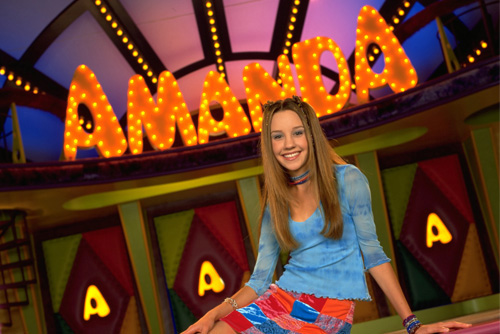History repeats itself, they say. And the evolution of child stars certainly supports that axiom, from Judy Garland to River Phoenix. The trajectory of these precocious celebrities is a downward one, littered with addiction and depression and sometimes mental illness. But, in more recent times, this descent has become more of a spectator sport. We followed live updates of Britney shaving her head and attacking a car with an umbrella and salivated over every newly leaked Linsday mugshot. In a twisted way, our obsession with celebrity meltdowns has begun to mirror the voyeuristic blood thirst of the Hunger Games, only in this version there are no opponents in the arena, just self destruction. And this has never been more troubling than with Amanda Bynes.
Bynes got her first break in a Buncha Crunch commercial and went on to appear in stage versions of Annie, The Sound of Music and The Secret Garden. But it was her stint on Nickelodeon's sketch comedy show All That and her subsequent spin-off The Amanda Show that propelled her to stardom. A network sitcom called What I Like About You and a couple starring film roles followed, but, as is often the case in Hollywood, her fifteen minutes ticked away.
And then Bynes started tweeting. At first, it was random proclamations of "retiring" from acting, which, after a few vehicular run-ins with the law including a DUI charge, became tweets to President Obama proclaiming that she doesn't drink. Was she using Twitter as a comedic tool? It soon became increasingly apparent that this wasn't the case, as she tweeted an explicit reference to rapper Drake so infamous I don't even have to type it out here and even sharing topless photos of herself. Maybe she was trolling the world, riling everyone up by pretending to go down the road Lindsay Lohan and co. have paved in preparation for a big comeback? Despite all the wishful thinking of a media strategy, it's become clear that whatever she is doing is not performance art.
The media is always hungry for a breakdown of this level and we are always ready to consume it. Have the entertainment shows and grocery store magazines conditioned us to want follow this kind of drama or are they just giving us what we've always wanted? That's difficult to say. The more important question is why do we as a culture thirst for this kind of display, especially when it relates to young women? Yes, Charlie Sheen's breakdown grabbed headlines too, but there's something in the way the Lindsays, Britneys and Amandas are hounded and criticized by the press at their weakest points that is a bit troubling. It speaks to a larger issue of latent misogyny, a disease that bleeds into our advertisements, magazine covers, and the way female characters are forced into the role of the madonna or the whore in television shows. It's somehow more fun to criticize girls like Amanda Bynes rather than Joaquin Phoenix because we as a culture have been doing it for so long and because we've become so good at it.
In some weird parasitic way, we are connected to these celebrities. We grew up with them and relied on them to distract us from our problems and they relied on us to stay relevant. Their exploits are only broadcast because we care (not in a kind of I-care-what-happens-to-you way, but in a I-care-about-being-entertained-by-you way). Somewhere along the way, we have lost sight of these larger-than-life people as human beings and began to view them as court jesters, beings that exist solely for our own amusement.


